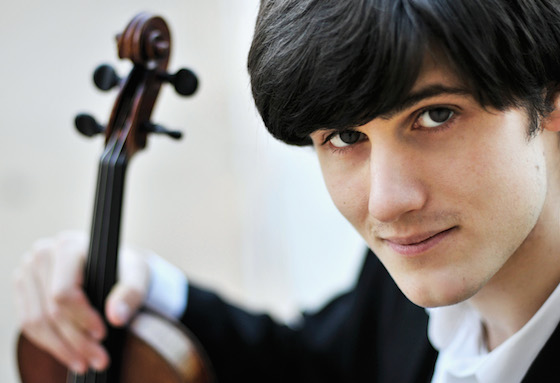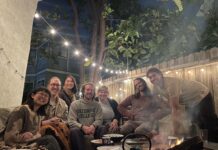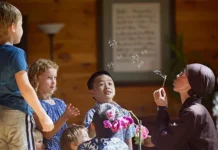
Christine from Wake Up Chicago chats with Nigel Armstrong, a concert violinist, about the year he spent as a Happy Farmer in Upper Hamlet at Plum Village. Nigel is an alumnus of the Colburn School and Curtis Institute of Music. He was recently appointed the concertmaster of Santa Cruz Symphony, and began serving in that role in Fall 2016.
Christine: What sparked your decision to spend a year at Plum Village?
Nigel: I decided to go to Plum Village because a friend gave me You Are Here by Thich Nhat Hanh in early October 2013 and it touched something very deep in me. Since then I’ve read many of the books he’s published and listened to many of the dharma talks available online, but looking back, I think You Are Here really encapsulated some of his core teachings.
The way I was affected by this book was also perhaps because of where I was in life at the time. It was my first experience being outside of school, outside of an institution’s structure, which was wonderful in many ways because it gave me more time to consider and reflect. It seemed clear to me that whatever path I took in life was now up to me in a way it hadn’t been before.
What I saw in Thich Nhat Hanh’s teachings were that they were answers to a lot of the questions I had had over the years. There were a lot of things I’d developed in life, like unhealthy thought patterns or feelings about certain things that I’d sort of stored away. So it felt like wow, this was really the way forward for me and I had to pour all my energies into exploring the teachings. It was that kind of spark that eventually led me to go live at Plum Village.
I came to realize how the way I had handled my reaction to my family circumstances had colored a lot of other areas of my life.
Christine: What were some of those negative patterns or difficulties that you recognized and came to terms with during your time at Plum Village?
Nigel: One big thing was my family situation and, more specifically, my feelings about it. My parents went separate ways when I was fifteen, and my response at the time was to kind of bottle up or ignore what I felt about this decision and all that had led to it. Of course, once I started practicing meditation and delving into the Plum Village teachings, memories and emotions relating to my family were some of the first things that arose. I came to realize how the way I had handled my reaction to my family circumstances had colored a lot of other areas of my life.
Also, feelings around the food industry was actually a pretty big thing for me. In my teens, I went vegetarian then vegan. I was a pretty strict vegan for about two years, and I was coming to terms with all that goes on with that. I developed really strong emotions around that. I was convinced when I was 16 that veganism was my path and that everyone else should follow suit. And then I just ended up not doing so well physically with my health. For years after that, I kind of went back and forth between being vegan and eating everything, somewhere on that spectrum. And either feeling cowardly and bad about my eating choices or feeling not good health-wise. I found in Plum Village a place where people don’t ignore the huge issue of the food industry’s effect on the environment and other species, but where there’s also a lot of understanding and warmth offered to those who aren’t vegan or vegetarian. Getting to spend most of my year there working on the “Happy Farm,” the community’s organic vegetable farm, was also profoundly educational and healing. Nothing like actually taking part in the process!
I found in Plum Village a place where people don’t ignore the huge issue of the food industry’s effect on the environment, but where there’s also a lot of understanding and warmth offered to those who aren’t vegan or vegetarian.
Christine: What were some of the most powerful or transformative aspects of your year at Plum Village?
Nigel: I feel really fortunate to have spent so long in Plum Village, and to have had the chance to really lay down some positive neural connections. Also for me, a big thing was the community aspect of Plum Village. Partially because of my personality, partially because I was somewhat homeschooled for a few years, and also because I’m a classical musician, I’ve spent a lot of time in a practice room. I’ve spent a lot of alone time in my life. And there have been times when I’ve been really just uncomfortable around people, or it’s been easy for me to just spend a lot of time by myself.
One of the wonderful things for me about Plum Village was just to be able to share so much, to be around people I could really share truthfully with about what was really going on. I feel like I’ve grown much more used to being around people, which is really such a central part of life for most everyone. It’s such a wonderful thing to be open with other people.
Christine: What were the biggest challenges you faced during your time there?
Nigel: One of the biggest challenges I dealt with was something that wasn’t really addressed in the teachings, something that may be somewhat unique to my experience. For about two years, whenever it felt like I was getting in touch with the core of my being, with my deepest aspirations, I would touch on what felt like a compulsion, almost a command, to drop and leave everything and everyone in order to come to terms with ultimate reality, with God. I didn’t quite know what to make of it and didn’t know what “dropping everything” really meant, save for that I felt like a coward for continuing on as I had been. Most of the times the compulsion came up, I would just wait for it to pass. But I did finally act on it in May of last year, going off by myself to the French woods for a few days. What I ended up getting in touch with was not so much ultimate reality and God as deep loneliness and all the worry I was causing others by my disappearance. (I hadn’t told anyone where I’d gone or how long I’d be gone for, partially because I had no idea myself.)
Then in early October of last year I experienced a huge shift inside. Suddenly, somehow, there was solidity where this feeling of emptiness––this feeling like I was being a coward for not taking up this mysterious quest––had been. I’m still not sure quite what caused it but it was around that time that I shared some pretty dark and primal stuff with a patient and compassionate friend (who was practicing excellent “Deep Listening”!). Perhaps this experience allowed me to finally feel at peace with myself.
One of the wonderful things for me about Plum Village was just to be able to share so much, to be around people I could really share truthfully with about what was really going on.
Christine: Did your experience at Plum Village influence your music-making?
Nigel: Meditation and mindfulness practice has really affected my music in the sense that I feel much freer to both practice and perform in a stream-of-consciousness way, to just be with whatever is coming up, and really feel the sensation of the instrument. When I’m playing with other musicians, I feel much more receptive to the energy around me, and I’m much more flexible in making something together.
Growing up as a classical musician, I focused on technique to the point where I wasn’t actually able to feel the beauty of a phrase each time I played it. For years, before I got onstage, I felt this moral compulsion not to go onstage. Like I shouldn’t be doing this. And I would always push myself over that, and then I would get into performing mode, which was more or less successful. I would kind of force myself to put on a show or force myself to be really into the music. A few years ago, I didn’t really appreciate the beauty that there is in music, in art, in music and classical music. I didn’t really appreciate what I as a musician can get out of it, and what others can receive from my own music, art and what it can mean to different people.
Christine: What was it like transitioning out of monastery life after spending a year at Plum Village?
Nigel: Well, exciting in many ways. The world is a large and colorful place. It was also neat, after living in a structured and specific environment for quite some time, to see all the different paths that people follow in life and all the ways people are able to find meaning and contentment. All that said, I’ve grown to appreciate all I learned in Plum Village. I admire, perhaps more and more, what the community members there have created. I got to visit recently after almost a year away, and I was touched by the strength of the positive energy there, and by the peace and calm and clarity that has been maintained so beautifully.
Meditation and mindfulness practice has really affected my music in the sense that I feel much freer to both practice and perform in a stream-of-consciousness way, and really feel the sensation of the instrument.
Christine: What are some of the challenges and rewards you’ve experienced practicing out in the world rather than in the monastery?
Nigel: One overriding dynamic that I’ve noticed being back in, say, contemporary urban society, is the general stimulation level, which is much greater than in the monastery. Sounds are louder, people walk and talk faster, and there are many more attention-grabbing signs and scenes than in the monastery. This has been exciting and at times invigorating, but it has also posed challenges. I’ve gotten overwhelmed a number of times, that’s for sure.
Christine: How do you keep your mindfulness practice alive now?
Nigel: I continue to meditate, mostly sitting or standing, every day, and with others when I get the chance. It really is a central part of my life, a type of anchor. I can start to feel it in my body when I don’t meditate for a while. It’s as if my synapses start to go a bit fuzzy. This I guess is the core of my practice. Otherwise I kind of “go with the flow,” with whatever feels right in life at the time.

















How do I go about finding what is required to spend time at PLUM VILLAGE? I am almost 79. I have a desire to spend my last years in compassion for living my life to help all beomgs.